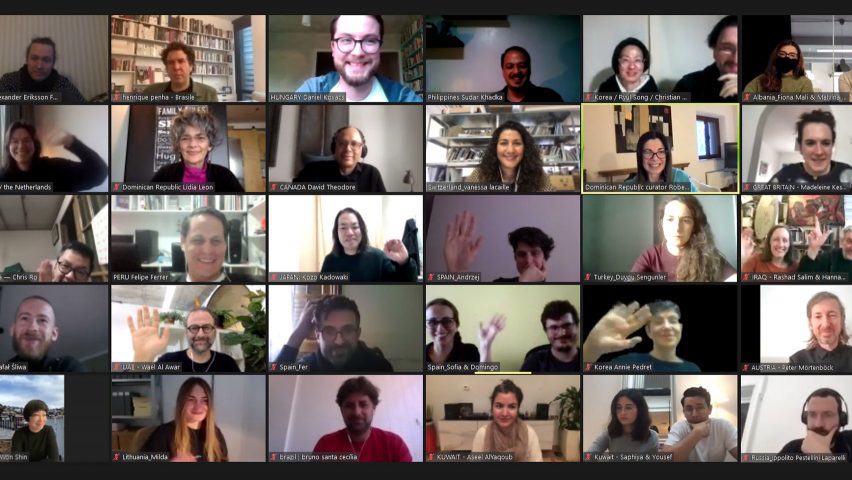Curators of fifty national pavilions at the Venice Architecture Biennale have come together to collaborate and share resources as part of the Curators Collective.
The newly-founded Curators Collective challenges the usual approach to the Venice Architecture Biennale, where participants develop pavilions in isolation in response to a shared theme.
Instead, the fifty members are working together and supporting each other through the sharing of resources, promotion of each others' work and a shared programme of events they have curated for the festival.
"This biennale was an opportunity to respond in a different way"
The collective was initiated by Hae-Won Shin, the curator of the South Korean pavilion, in response to the uncertainty faced by participants in the lead up to the festival.
The event was due to begin on 23 May 2020 but was postponed until May 22 2021 due to the coronavirus pandemic.
"No one knew what was going to happen to the biennale, whether anyone would ever get to see any of the exhibitions we had been working on," said Shin, acting as spokesperson for the collective.
"This biennale was an opportunity to respond in a different way, to pool resources, create collaborative projects, share information and support each other tangibly," she told Dezeen.
"Times have changed"
According to Shin, the collective is also a direct response to the theme of this year's festival set by chief curator Hashim Sarkis: How will we live together?
The group, which represents 50 out of the 60 national pavilions, believes it is a microscale demonstration of how global challenges such as Covid-19 can be tackled through international collaboration and solidarity.
"This question has taken on a new significance over the last year and a half, and it forces us to confront questions that, as architects and curators, are fundamental," Shin explained.
"Times have changed. Humanity is facing very big challenges that will affect us all. To actually achieve change in relation to the climate crisis, migration, inequality, and technological overload, we need to work together," she said.
"Through our regular meetings, we have identified a large number of commonalities in our approaches and themes, creating connections that overcome the barriers of borders and politics," added Shin.
"This collective is one, very small example of how collaboration can lead to something more interesting, another dimension in how we will live together."
Collective offered "important morale boost"
According to the group, the network has already made a "significant difference" to the participants during the lead-up and opening of the Venice Architecture Biennale.
At a basic level, curators have been able to find and share storage areas and report back from Venice on the progress of pavilions to collective members who have been unable to attend.
Now it is preparing its own programme of events, including a "pavilion festival" involving a guided tour of the national pavilions that will take place in October.
"Being able to communicate and share thoughts around how to find a life and an audience for the work that had already been created was an important morale boost," Shin said.
"For now, our priority is 2021, opening our pavilions, organising successful and inspiring collateral events, and actively contributing to a worldwide conversation about the future of architecture in an uncertain world."
Group will have presence at future biennales
Moving forward, the group is working to ensure Curators Collective has a presence at all future Venice Architecture Biennales to help participants adapt to future needs and scenarios.
It has received official recognition by the biennale and inclusion in the festival's Historical Archives of Contemporary Arts (ASAC), and will now develop a strategy for handing it over to the next set of curators.
"We hope to see the Curators Collective become an integral part of all future architecture biennales," concluded Shin.
"We are hoping that we can build something lasting that can be handed down through the hands of each year's curators," she said.
"We want to support the structure of the biennale by illustrating how much potential there is in international collaboration, how many commonalities there are between all these different nations and how much goodwill can be harnessed towards powering projects that actively engender positive change."
The ambitions of the Curators Collective echo the reflections of chief curator Sarkis, who told Dezeen that the postponement of the event had some positive repercussions such as increased collaboration.
"Many [curators] relied on local architects to help them install their buildings and their projects, which created partnerships between Italian firms and non-Italian firms, so that has been very moving to watch," he said.
"You see this level of solidarity among the participants where, because of this extra year, they got to know each other more and exchange ideas and learn from each other. Because of the extra year, they became friends."
Images are courtesy of Curators Collective.
The Venice Architecture Biennale takes place from 22 May to 21 November 2021. See Dezeen Events Guide for all the latest information you need to know to attend the event, as well as a list of other architecture and design events taking place around the world.

